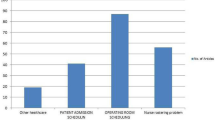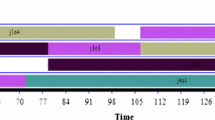Abstract
Since various service needs for pricing and setting due dates in the handmade wood product industry are increasing dramatically, a differentiated service based on the maximal profit criterion becomes an important marketing strategy for customer relationship management (CRM). However, other important objectives of customer satisfaction maximization are often ignored. In this paper, a multiobjective differentiated service model based on customer preference information on pricing and due date setting into consideration in the handmade wood product industry is proposed. Since resolving the differentiated service model is an NP problem, a multiobjective hybrid heuristic method is proposed. The hybrid heuristic method integrates large neighborhood search (LNS) into particle swarm optimization (PSO). The results revealed that the proposed method is better than existing methods and other heuristic methods for the single or differentiated service model in terms of both profit and customer satisfaction criterion. Some sensitivity analysis for different customer segments and different arrival rates is also considered.
Similar content being viewed by others
References
Armstrong G, Kotler P (2000) Marketing: an introduction, 5th edn. Prentice Hall, New Jersey
Baines TS, Lightfoot HW, Benedettini O, Kay JM (2009) The servitization of manufacturing: a review of literature and reflection on future challenges. J Manuf Technol Manag 20(5):547–567
Baños R, Gil C, Paechter B, Ortega J (2007) A hybrid meta-heuristic for multi-objective optimization: MOSATS. J Math Model Algorith 6:213–230
Behnamian J, Fatemi Ghomi SMT, Zandieh M (2009) A multi-phase covering pareto-optimal front method to multi-objectives scheduling in a realistic hybrid flowshop using a hybrid metaheuristic. Expert Syst Appl 36(8):11057–11069
Berman B (2005) Applying yield management pricing to your service business. Bus Horiz 48:169–179
Chen Y, Cheng C, Wang L, Chen T (2013) A hybrid approach based on the variable neighborhood search and particle swarm optimization for parallel machine scheduling problems—a case study for solar cell industry. Int J Prod Econ 141:66–78
Chan, F. T. S. and Chung, S. H., “A modified multi-criterion genetic algorithm for order fulfillment in manufacturing network”, Proceedings of the 9th Asia Pacific Industrial Engineering & Management System Conference, APIEMS, Indonesia, pp. 2221–2226, 2008.
Cronin JJ, Brady MK, Hult GTM (2000) Assessing the effects of quality, value, and customer satisfaction on consumer behavioral intentions in service environments. J Retail 76(2):193–218
Dalila BM, Fontes M, Gasper-Cunha A (2010) On multi-objective evolutionary algorithms. Appl Optim 103:287–310
Davis-Sramek B, Mentzer JT, Stank TP (2008) Creating consumer durable retailer customer loyalty through order fulfillment service operations. J Oper Manag 26:781–797
Fishburn PC, Odlyzko AM (2000) Dynamic behavior of differential pricing and quality of service options for the internet. Decis Support Syst 28:123–136
Gao J, Yao Y, Zhu VC, Sun L, Lin L (2011) Service-oriented manufacturing: a new product pattern and manufacturing paradigm. J Intell Manuf 22(3):435–446
Gebauer H, Gustafsson A, Witell L (2011) Competitive advantage through service differentiation by manufacturing companies. J Bus Res 64(12):1270–1280
Hansen P, Mladenović N (2001) Variable neighborhood search: principles and applications. Eur J Oper Res 130:449–467
Hansen P, Mladenović N (2010) Variable neighborhood search: methods and applications. Ann Oper Res 175:367–407
He Y, Lai KK, Sun H, Chen Y (2014) The impact of supplier integration on customer integration and new product performance: the mediating role of manufacturing flexibility under trust theory. Int J Prod Econ 147:260–270
Jaeggi DM, Parks GT, Kipouros T, Clarkson PJ (2008) The development of a multi-objective tabu search algorithm for continuous optimisation problems. Eur J Oper Res 185(3):1192–1212
Jones DF, Mirrazavi SK, Tamiz M (2002) Multi-objective meta-heuristics: an overview of the current state-of-the-art. Eur J Oper Res 137(1):1–9
Kotler, P., “Marketing Management-Analysis, Planning, Implementation and Control”, 7th ed., Prentice-Hall Inc., 1991.
Kurata H, Nam SH (2010) After-sales service competition in a supply chain: optimization of customer satisfaction level or profit or both? Int J Prod Econ 127:136–146
Lambert, D. M. and Stock, J. R., “Strategic Logistics Management”, 3rd ed., Irwin, 1993.
Li JQ, Pan QK, Liang YC (2010) An effective hybrid tabu search algorithm for multi-objective flexible job-shop scheduling problems. Comput Ind Eng 59(4):647–662
Lii YS, Sy E (2009) Internet differential pricing: effects on consumer price perception, emotions, and behavioral responses. Comput Hum Behav 25:770–777
Mestry S, Damodaran P, Chen CS (2011) A branch and price solution approach for order acceptance and capacity planning in make-to-order operations. Eur J Oper Res 211:480–495
Moslehi G, Mahnam M (2011) A Pareto approach to multi-objective flexible job-shop scheduling problem using particle swarm optimization and local search. Int J Prod Econ 129:14–22
Rabbani M, Bajestani MA, Khoshkhou GB (2011) A multi-objective particle swarm optimization for project selection problem. Expert Syst Appl 37:315–321
Reyes-Sierra M, Coello CA (2006) Multi-objective particle swarm optimizers: a survey of the state-of-the-art. Int J Comput Intell Res 2:287–308
Saccani N, Johanssonb P, Peronaccani M (2007) Configuring the after-sales service supply chain: a multiple case study. Int J Prod Econ 110:52–69
Shao X, Liu W, Liu Q, Zhang C (2013) Hybrid discrete particle swarm optimization for multi-objective flexible job-shop scheduling problem. Int J Adv Manuf Technol 67:2885–2901
Stole LA (2007) Price discrimination and competition. Handb Ind Org 3:2221–2299
Sun Y, Zhang C, Gao L, Wang X (2011) Multi-objective optimization algorithms for flow shop scheduling problem: a review and prospects. Int J Adv Manuf Technol 55:723–739
Ting CJ, Wu KC, Chou H (2014) Particle swarm optimization algorithm for the berth allocation problem. Expert Syst Appl 41:1543–1550
Ulaga W, Reinartz WJ (2011) Hybrid offerings: how manufacturing firms combine goods and services successfully. J Mark 75(6):5–23
Ülkü MA, Bookbinder JH (2012) Optimal quoting of delivery time by a third party logistics provider: the impact of shipment consolidation and temporal pricing schemes. Eur J Oper Res 221:110–117
Valletti TM (2000) Price discrimination and price dispersion in aduopoly. Res Econ 54:351–374
Wang D, Hong KL (2008) Multi-fleet ferry service network design with passenger preferences for differential services. Transp Res B Methodol 42:798–822
Wimble M (2012) An industry-level examination of information technology outsourcing in services and manufacturing. JITTA: J Inf Technol Theor Appl 13(4):21–28
Author information
Authors and Affiliations
Corresponding author
Appendix A (Questionnaire for product: cookie box)
Appendix A (Questionnaire for product: cookie box)



Rights and permissions
About this article
Cite this article
Liu, SC., Chung, CH. & Lai, YC. A multiobjective differentiated service model for pricing and due date setting in the handmade wood product industry. Int J Adv Manuf Technol 77, 131–144 (2015). https://doi.org/10.1007/s00170-014-6440-0
Received:
Accepted:
Published:
Issue Date:
DOI: https://doi.org/10.1007/s00170-014-6440-0




